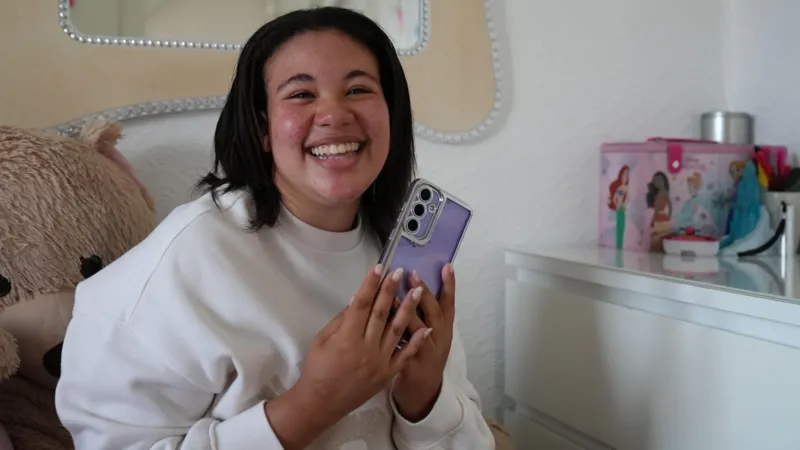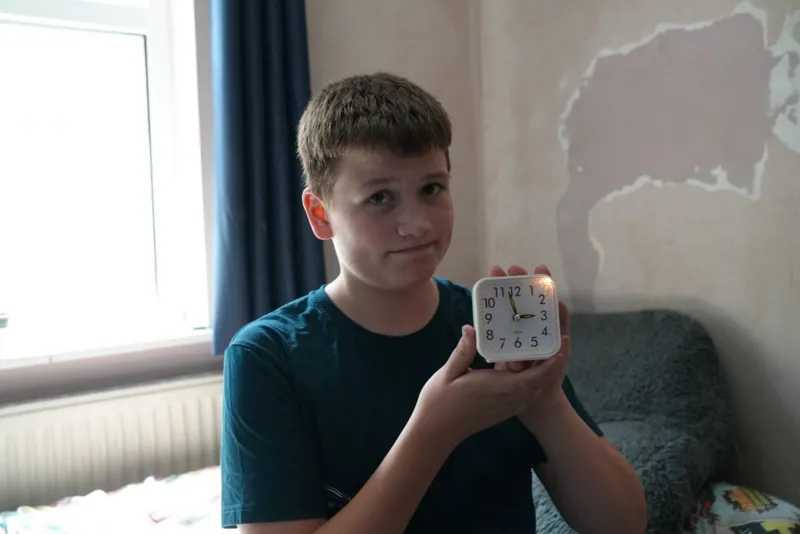Tech-Free Bedrooms for Teens are becoming a popular way to help young people sleep better, focus more, and reconnect with their families. In today’s always-connected world, this might sound like an impossible challenge — but what happens when teenagers actually try it?
A group of students from Bradford, the 2025 UK City of Culture, decided to remove phones, laptops, and gaming consoles from their bedrooms for five days straight. The result? Improved sleep, better focus at school, and even more family time.
We followed two participants, Elizabeth and Henry, to understand how this bold experiment affected their daily routines, mood, and relationships.
Why Tech-Free Bedrooms for Teens Matter
Teenagers spend hours each day glued to screens, often staying up late watching videos, gaming, or scrolling social media. According to a survey conducted by BBC Radio 5 Live and BBC Bitesize, 38% of teens who identify as gamers spend seven or more hours per week gaming in their bedroom, and some boys spend more than 20 hours isolated from their families.
Experts warn that late-night screen exposure disrupts sleep cycles due to blue light, constant notifications, and the temptation to stay online longer than intended. By creating tech-free bedrooms for teens, parents can encourage healthier sleep patterns and reduce anxiety, stress, and digital overload.
Meet Elizabeth: A Pop Culture Fan Facing the Challenge
Thirteen-year-old Elizabeth describes her bedroom as her “peace place,” where she spends three to four hours every night watching YouTube videos of her favorite singer, Sabrina Carpenter. She admits she rarely spends time with her parents after school, usually heading straight to her room.
But during the tech-free bedrooms for teens challenge, she had to leave her phone and laptop outside her room and spend time in shared spaces. Her father, Robin, was skeptical, even betting that she wouldn’t last five full days without cracking.

Henry’s Gaming Detox: From 2AM Marathons to Early Nights
Henry, 13, is a passionate gamer who often plays online until 10 PM — sometimes staying up until 2AM. For the challenge, he stored his PlayStation in a cupboard to resist temptation.
“I forget to even drink water sometimes when I’m gaming,” Henry admits. Moving his console to the living room forced him to game in a shared space, where he had to watch his language around his mother and couldn’t stay up too late.
The result? Henry started sleeping earlier, felt more rested in the mornings, and even noticed better focus in school.

The Science Behind Tech-Free Bedrooms for Teens
Dr. Kaitlyn Regehr, associate professor at University College London, says the benefits of tech-free bedrooms are clear:
- Better sleep quality: Teens need 8–10 hours of sleep, but late-night notifications and blue light often delay sleep onset.
- Improved mental health: Less screen time reduces overstimulation and gives teens more time for mindfulness and offline hobbies.
- Stronger family bonds: Removing devices from bedrooms encourages conversation and shared activities in communal spaces.
She recommends basic safety checks for parents, such as knowing who their teens are gaming with, disabling geo-location, and ensuring games are age-appropriate.
Unexpected Benefits: Creativity and Real-World Activities
By day three, Elizabeth discovered new ways to fill her time. Out of boredom, she baked chocolate chip bread and researched ballet lessons.
“If I still had my tech, I would have procrastinated baking until next week,” she said. Her parents noticed that she chose to watch documentaries on the family TV instead of isolating herself with online videos in her bedroom.
Survey Insights: Teens and Their Screens
The BBC Radio 5 Live and Survation survey revealed key data about teen tech habits:
- 38% spend five or more hours daily on their phones.
- 39% said they would consider removing tech from their bedrooms to cut down screen time.
- 66% use built-in features like scheduled breaks to manage usage.
- 27% reported that their parents set no limits on tech or gaming at all.
Clearly, many teens are aware of the problem and open to solutions like tech-free bedrooms for teens to regain balance.
Family Reactions: From Skepticism to Support
Robin, Elizabeth’s dad, lost his bet but was proud of her for lasting the full five days. “A deal’s a deal,” he said as he handed over two packets of sweets.
Henry’s mom, Alyson, said she was impressed with his improved sleep schedule and openness to conversation. “He’s done really well,” she said, adding that she plans to keep encouraging tech-free nights.
How Parents Can Try Tech-Free Bedrooms for Teens
If you want to try this experiment at home, here are some practical tips:
- Start small: Begin with just one or two tech-free nights per week.
- Use an alarm clock: Replace smartphones with analogue alarm clocks to prevent late-night scrolling.
- Create shared spaces: Encourage gaming and social media use in living rooms or dining areas.
- Set clear expectations: Make it a family challenge so teens don’t feel singled out.
- Focus on rewards: Celebrate milestones, such as a week of better sleep or improved grades.
The Takeaway: Tech-Free Bedrooms for Teens Work
The experiment proved that tech-free bedrooms for teens can lead to better sleep, improved focus at school, and more quality family time. While Henry quickly returned his PlayStation to his room at the end of the challenge, he vowed to keep his phone outside at night because of how much it improved his sleep.
Elizabeth’s parents said they noticed a positive shift in her habits — one that might stick even after the challenge.
For parents worried about their teenagers’ screen time, this simple step could be the key to reducing digital distractions and helping teens thrive.
Source: BBC News



